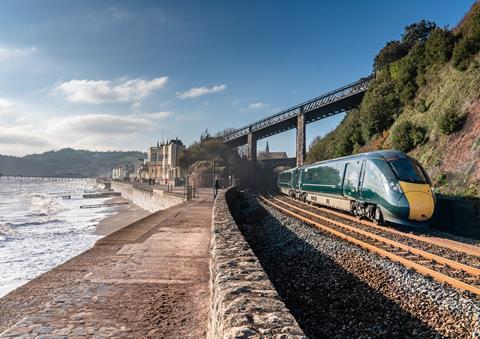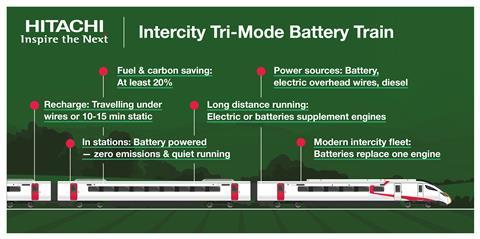
UK: Leasing company Eversholt Rail and Hitachi Rail Europe have signed a memorandum of understanding to develop an underfloor battery powerpack to be trialled on a Class 802 electro-diesel inter-city trainset operated by Great Western Railway on the London – Penzance route.
They envisage that the battery pack would replace one of the underfloor diesel engine modules in a five-car Class 802, capturing regenerated braking energy for reuse and offering potential fuel savings of more than 20%. As well as reducing greenhouse gas emissions, the tri-mode unit would be able to operate in and out of stations on the non-electrified section of the route using battery power, improving local air quality and reducing noise.
Hitachi Rail Europe will draw on the company’s experience in Japan, where Dencha battery trains are currently carrying passengers on two regional routes with a wire-free range of 50 km.
In July, it signed an agreement with Hyperdrive Innovation to create and develop battery packs for mass production at Hyperdrive’s HYVE facility in Sunderland, close to Hitachi’s Newton Aycliffe plant where one of GWR’s 36 Class 802 sets would be retrofitted.
‘We are committed to reviewing emerging technologies such as battery power and assessing feasibility for services and rolling stock on the GWR network’, explained the operator’s Interim Managing Director Matthew Golton. ‘This is a really exciting development and we look forward to working closely with both Hitachi Rail and Eversholt Rail on this trial.’

Decarbonisation strategy
At present only 85 km of the 491 km direct line between London Paddington and Penzance is electrified, with the majority of the journey completed using diesel power.
Network Rail’s recently published Traction Decarbonisation Network Study recommended the extension of 25 kV 50 Hz electrification to Exeter as a ‘core’ project with the remainder of the main line to be electrified in due course, although branches in Devon and Cornwall were identified as having potential for alternative traction such as batteries or hydrogen.
Eversholt and Hitachi suggest that installing batteries on the existing inter-city trains would complement future electrification and help ‘to improve the business case for upgrades that can level-up the South West and provide a low emission alternative to domestic air travel’.
The Hitachi-built AT300 bimode trainsets used by GWR have three 700 kW underfloor engines on a five-car trainset and five on a nine-car unit. The promoters believe that improvements in battery technology – particularly power output and charge – would allow incremental replacement of more diesel engines in future, outlining an ambition to create by 2040 ‘a fully electric-battery intercity train that can travel the full journey between London and Penzance’.
‘Eversholt Rail is committed to ensuring our fleets meet the UK railway’s decarbonisation commitments’, said CEO Mary Kenny on December 15. ‘We are delighted to continue working in partnership with Hitachi to investigate the conversion of our Class 802 fleet to tri-mode by introducing battery technology.’
Suggesting that ‘battery powered trains will support us in our battle against climate change and poor air quality’, Rail Minister Chris Heaton Harris said ‘developments like this are major stepping stones towards achieving the UK’s 2050 net-zero emissions target.’
Hitachi Rail’s Country Lead for UK & Ireland Jim Brewin said that ‘Britain is in a unique position to become a global leader in battery trains. We want support the UK’s green economic recovery and levelling-up.’



